Originally posted by TrueMacedonian
View Post
Indigen's theory of indigenous culture
Collapse
X
-
I don't mean to be a pain, but that doesn't really answer my very specific questions. I was hoping that you would apply the same sort of intellectual rigour in testing assumptions about the existence of an ancient "Hellenic RACE", as you do in relation to what you call "Indigen's theory of indigenous culture".Last edited by aleksandrov; 04-03-2010, 05:59 AM.All truth passes through three stages. First, it is ridiculed. Second, it is violently opposed. Third, it is accepted as being self-evident. Arthur Schopenhauer
https://www.facebook.com/igor.a.aleksandrov?ref=tn_tnmn
-
-
As a rule, I find being accurate and clinical in statements a virtue for reasons I have already explained, be mindful of the advice and you will receive less critics.Originally posted by indigen View PostSorry SOM, I should have edited my original post instead of being satisfied with explaining the same to Osiris, who ask exactly same question. :-)In the name of the blood and the sun, the dagger and the gun, Christ protect this soldier, a lion and a Macedonian.
Comment
-
-
I'll try and answer your question again.Originally posted by aleksandrov View PostTrue Macedonian,
Since I don't have much time for ancient history research these days, could I ask you what the evidence is that there was ever such an ancient RACE as "hellenes"?
How do you define the term 'race' as applied to the relevant period and context?
Who belonged to this ancient 'race' of 'hellenes'?
Was the term 'hellenes' or any variation of it used to describe this 'race' in its own time, or is the term 'hellenes' merely one used by more contemporary translators, who (perhaps with thin foundations) equate 'race' with culture, like some historian in 1,000 years time might decide to speak of the European or Western 'race' of today?
The ancient Hellenic race may be defined as a people who shared the same cultural aspects, religion, and to some extent (not necessarily the biggest or accurate) language, as well as common descent of being born within the city-state periphery. The ancient Olympic games were designated only for people of Hellenic descent. Those born in the periphery of the city-states that shared these cultural, religious, and not so important linguistic aspects were considered Hellenes and considered each other as such. When Alexander I of Macedon wanted in the games he was rejected on account that he was not a Hellene.How do you define the term 'race' as applied to the relevant period and context? Who belonged to this ancient 'race' of 'hellenes'?
Was there a race of ancient Hellenes? Yes there was. Ancient sources can vouch for that.
I don't have original works of antiquity in front of me but assuming that many historians today like Borza, Green, Grant and etc have translated Isocrates correctly for writing the following(just an example);Was the term 'hellenes' or any variation of it used to describe this 'race' in its own time, or is the term 'hellenes' merely one used by more contemporary translators, who (perhaps with thin foundations) equate 'race' with culture, like some historian in 1,000 years time might decide to speak of the European or Western 'race' of today?
So far has Athens left the rest of mankind behind in thought and expression that her pupils have become the teachers of the world, and she has made the name of Hellas distinctive no longer of race but of intellect, and the title of Hellene a badge of education rather than of common descent.
then we know that the term Hellene started to become a term which was more of a cultural aspect rather than an aspect of common descent i.e. "Hellene by Blood" type of deal. There may be some cases that the term 'Hellene' used to describe non-hellenic peoples was employed due to religious or cultural similarities. Here's a topic that was started recently on Maknews about 1 Maccabees http://www.maknews.com/forum/macedon...es-t19086.html where it seems like the Jews associated pagan traditions with the ancient hellenes when describing ancient Macedonians.
If I haven't been more specific please tell me and point out where.
Comment
-
-
What is the authoritative source of this definition of 'race', TM?Originally posted by TrueMacedonian View PostI'll try and answer your question again.
The ancient Hellenic race may be defined as a people who shared the same cultural aspects, religion, and to some extent (not necessarily the biggest or accurate) language, as well as common descent of being born within the city-state periphery....
Is it an ancient definition or a modern one?
Did everybody agree on its meaning in ancient times?
What does the term 'race' mean today?
Was 'race' the word used in the ancient texts or is it a more modern word used to translate an ancient concept?
Do the source texts about this story use the term "Hellenic" or "Greek" or some other word? If they use the term "Hellenic", would you say that there was universal agreement as to what it meant to be "Hellenic" in those days?The ancient Olympic games were designated only for people of Hellenic descent...
So why did they not consider him a Hellene for the purpose of participating in the games? Because he wasn't born on the periphery of the city states and/or didn't share the cultural and religious aspects and/or because he didn't share the linguistic aspects as well?Those born in the periphery of the city-states that shared these cultural, religious, and not so important linguistic aspects were considered Hellenes and considered each other as such. When Alexander I of Macedon wanted in the games he was rejected on account that he was not a Hellene.
And did Alexander I consider himself a Hellene?
The correctness of translations is hardly every absolute, especially when one is translating material that is supposed to be over 2,000 years old. It often depends on certain popular assumptions, which translators might not bother to question too much, depending on their objective. But to the extent that the translation is correct, it would suggest that by the time of Isocrates, Hellenism, even in the eyes of some Athenians, was no longer a 'race', but a cultural status. So what period were you referring to previously when you spoke of the "Hellenic race"?Was there a race of ancient Hellenes? Yes there was. Ancient sources can vouch for that.
I don't have original works of antiquity in front of me but assuming that many historians today like Borza, Green, Grant and etc have translated Isocrates correctly for writing the following(just an example);
So far has Athens left the rest of mankind behind in thought and expression that her pupils have become the teachers of the world, and she has made the name of Hellas distinctive no longer of race but of intellect, and the title of Hellene a badge of education rather than of common descent.
Btw, have Borza, Green and Grant translated the original "Greek" texts themselves, or did they perhaps rely on other people's translations, at least partially?All truth passes through three stages. First, it is ridiculed. Second, it is violently opposed. Third, it is accepted as being self-evident. Arthur Schopenhauer
https://www.facebook.com/igor.a.aleksandrov?ref=tn_tnmn
Comment
-
-
Aleksandrov you have peeked my curiosity to delve further into this topic. So I did a little bit of research and found something that interests me and at the same time may even answer you at the same time. As for an authoritative source for the definition of race I don't believe that there even is one. However the source below will explain what some ancient Hellenes felt;What is the authoritative source of this definition of 'race', TM?
Is it an ancient definition or a modern one?
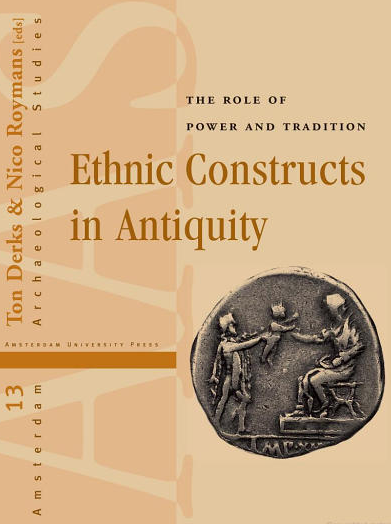
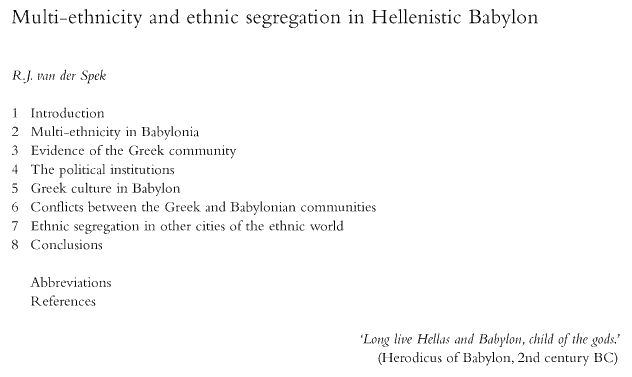
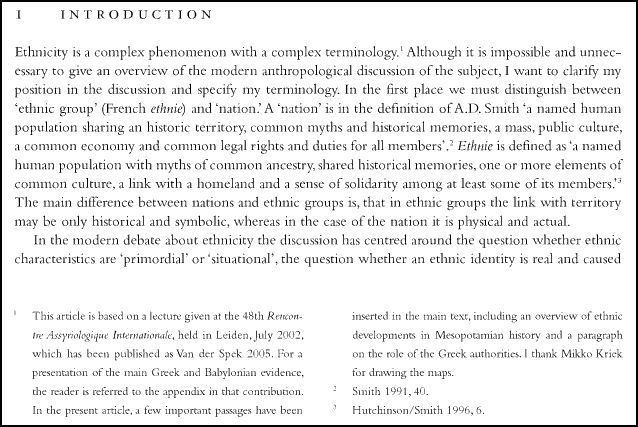
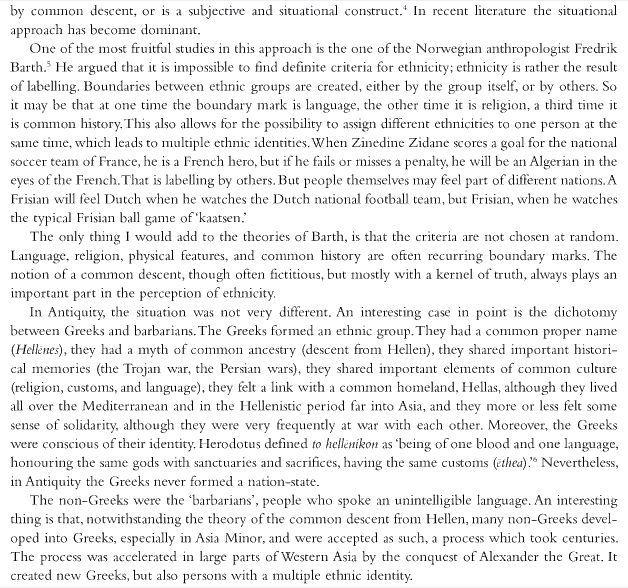
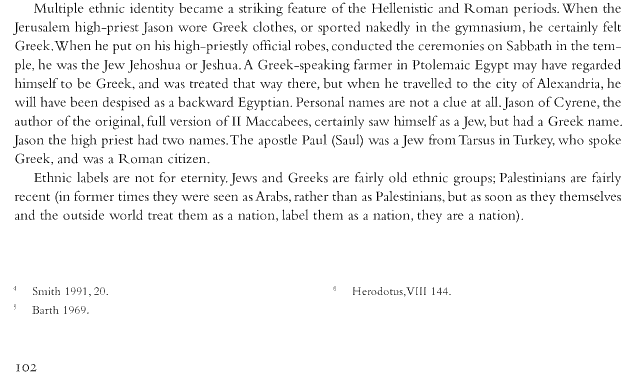
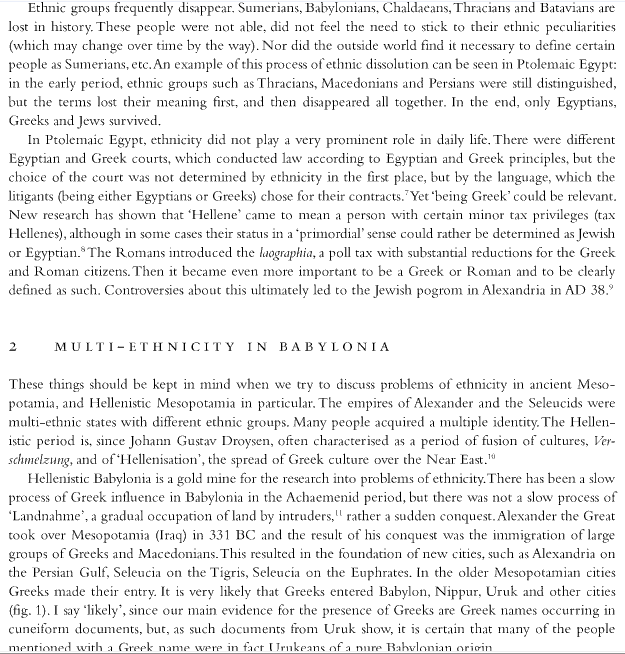
Impossible to answer.Did everybody agree on its meaning in ancient times?
I don't think anyone can answer this and be 100% accurate. Too many factors (political, cultural, religious) affect this meaning today. An example is the newly made "Greek Race" from the 19th century. They were ultimately the brainchild of Western Philhellenes. Politically invented and then they themselves branched out with religion being a main factor and some suggested that language or simply "living on greek soil" was enough to make someone a grk.What does the term 'race' mean today?
According to todays 'expert' and their translations (however accurate) the literal translation to modern languages would be "race".Was 'race' the word used in the ancient texts or is it a more modern word used to translate an ancient concept?
No Hellenic was more than likely not used. I wouldn't know what ancient Hellene word was used.Do the source texts about this story use the term "Hellenic" or "Greek" or some other word? If they use the term "Hellenic", would you say that there was universal agreement as to what it meant to be "Hellenic" in those days?
Because Macedonians were viewed as Barbarians by the Hellenes. All the things that would qualify for a "hellene" were not seen in an ancient Macedonian.So why did they not consider him a Hellene for the purpose of participating in the games? Because he wasn't born on the periphery of the city states and/or didn't share the cultural and religious aspects and/or because he didn't share the linguistic aspects as well?
Yes, but the explanation as to why is way to complicated to get into now. I recommend you read Borza, Grant, or Green for the reasons why Alexander I tried proving he was a Hellene and claiming a certain ancestry.And did Alexander I consider himself a Hellene?
Hellenism is a 19th century terminology that was defined and invented by a German named Droysen. Hellenistic - http://www.macedoniantruth.org/forum...ead.php?t=1088The correctness of translations is hardly every absolute, especially when one is translating material that is supposed to be over 2,000 years old. It often depends on certain popular assumptions, which translators might not bother to question too much, depending on their objective. But to the extent that the translation is correct, it would suggest that by the time of Isocrates, Hellenism, even in the eyes of some Athenians, was no longer a 'race', but a cultural status. So what period were you referring to previously when you spoke of the "Hellenic race"?
is also a newly invented term. The period of the "hellenic race" that I refer to is pre-Isocrates, i.e. what some might call "Periclean".
As for translations I think that the entire academic world would shit themselves silly if these translations have only been observed by a handful of people. I don't doubt that someone like Borza with his credentials has seen the original antique sources. However we have to be careful of when and how the term Hellene was being used after Isocrates infamous paraphrase (if that's even reliable in itself).
Comment
-
-
about "race"Originally posted by aleksandrov View PostIs it an ancient definition or a modern one?
Did everybody agree on its meaning in ancient times?
What does the term 'race' mean today?
Was 'race' the word used in the ancient texts or is it a more modern word used to translate an ancient concept?
Several times when is spoken about Macedonians, like example
Diodorus Siculus
In the "ancient greek" text is used "Makedon to Genos" , Macedonian by Genetics, Birth / Rod , naRod, tribe, what is clear proove that the Ancient Macedonians and the population south of Olimp were MAYBE in some blood relations*, but enough diferent to be on so many places mentioned as diferent Races, Nations, Cultures.The commandant of the garrison of that city, Archelaus, who was a Macedonian by race, welcomed Attalus and surrendered the city to him
Than, further, about the concept of Nation and Race, and their possible definitions / meanings thrue the ages.
You can see on many places, that people are using phrases as
- Macedonis (meaning Macedonian)
- Makedonec po Rod
- Makedonski (unnumbered examplex)
- Makedonskaja (not from Macedonia, but the Macedonian, Makedon(s)kata, Sveti Velikomachenica Irina Makedonska(ja)
- "born as Macedonian"
- Makedonjanin
- od roda Makedonskago
- rodom Makedonec
- many other examples where it is clear that the people not only originated from Macedonia and had roots or strong connections with the Term and the Land - Culture of Macedonia, but felt - described themself as Macedonians / Makedonci / Makedonski
Whatever the curent definition was, it is clear that the people identified themself with Macedonia and its past and Culture.
To me it is not known a single example where some Macedonian identified himself with the Bulgarian KhAGGAns, but unnumbered examples where they identified themself with many of the Macedonian Kings and heroes. (from the Kings, Faraos and Emperors to the Macedonian Saints , Schollars, etc...)
for end, take note on this quote:
Diodorus Siculus
edit:- For many days the king lay helpless under his treatment, and the Greeks who had been settled in Bactria and Sogdiana, who had long borne unhappily their sojourn among peoples of another race and now received word that the king has died of his wounds, revolted against the Macedonians. They formed a band of 3000 men and underwent great hardship on their homeward route. Later they were massacred by the Macedonians after Alexander’s death. [17.99.5-6.]
i am very sure i already wrote about this on this forum, or bratot did.
Friedrich Neubauer, Bernhard Seyfert, Lehrbuch der Geschichte 1. Teil (1922) (used on universities and other schools)
not so good english translation„Charakter der griechischen Kolonisation. Indessen hatte seit dem achten Jahrhundert eine neue Periode in der griechischen Entwicklung eingesezt. Griechenland, bisher ein Bauernland, in dem die Interessen des Ackerbaus und der Viehzucht alle anderen überwogen, wurde ein Land der SEEFAHRT und des HANDELS.
better Macedonian translationCharacter of Greek colonization. However, since the eighth century a new period in Greek development had begun / established. Greece, formerly a peasant country in which outweighed the interests of agriculture and cadle , turned into "country of See-Travel and the See-trade"
„Карактер на Грчката Колонизација. Од осмиот век се воспостави една нова ера во Грчкото развивање. Грција, до тогаш една рурална земја, каде преовладуваше обработување на почвата и одгледување на домашни животни, стана една земја на морепловството и трговијата“
this book and the big number of other sources where is cleared the "greek colonisation", or with other words the "creation" of the Ancient Greeks, can not be ignored just like that.
they are too many, even most of the Ancient Greek sources speak the same story:
- diferent race (logic if the Ancient Greeks were a mixure of afro-asiatic settlers / colonist / traders with some part of the Natives)
- enough diferent language, to be mentioned in several sources
- many other details who help to answer few questionsLast edited by Serdarot; 04-03-2010, 08:42 PM.Bratot:
Никој не е вечен, а каузава не е нова само е адаптирана на новите услови и ќе се пренесува и понатаму.
Comment
-


Comment